I have an application (spring-boot-shipping-service) with a KStream that gets OrderCreatedEvent messages generated by an external producer (spring-boot-order-service). This producer uses the following schema:
order-created-event.avsc
{
"namespace" : "com.codependent.statetransfer.order",
"type" : "record",
"name" : "OrderCreatedEvent",
"fields" : [
{"name":"id","type":"int"},
{"name":"productId","type":"int"},
{"name":"customerId","type":"int"}
]
}
My KStream<Int, OrderCreatedEvent> is joined with a KTable<Int, Customer> and publishes to the order topic a new kind of message: OrderShippedEvent.
order-shipped-event.avsc
{
"namespace" : "com.codependent.statetransfer.order",
"type" : "record",
"name" : "OrderShippedEvent",
"fields" : [
{"name":"id","type":"int"},
{"name":"productId","type":"int"},
{"name":"customerName","type":"string"},
{"name":"customerAddress","type":"string"}
]
}
For some reason the new OrderShippedEvent messages aren't generated with a header application/vnd.ordershippedevent.v1+avro but application/vnd.ordercreatedevent.v1+avro.
This is the original OrderCreatedEvent in the order topic:
Key (4 bytes): +
Value (4 bytes): V?
Timestamp: 1555943926163
Partition: 0
Offset: 34
Headers: contentType="application/vnd.ordercreatedevent.v1+avro",spring_json_header_types={"contentType":"java.lang.String"}
And the produced OrderShippedEvent with the incorrect schema:
Key (4 bytes): +
Value (26 bytes): V?
JamesHill Street
Timestamp: 1555943926163
Partition: 0
Offset: 35
Headers: contentType="application/vnd.ordercreatedevent.v1+avro",spring_json_header_types={"contentType":"java.lang.String"}
I've checked the Confluent Schema Registry contents, and the order-shipped-event.avsc schema is there:
Why isn't it using the correct shema in the generated message?
Below you can see the full configuration and code of the example, which is also available on Github (https://github.com/codependent/event-carried-state-transfer/tree/avro)
In order to test it just start a Confluent Platform (v5.2.1), spring-boot-customer-service, spring-boot-order-service, spring-boot-shipping-service and execute the following curl commands:
curl -X POST http://localhost:8080/customers -d '{"id":1,"name":"James","address":"Hill Street"}' -H "content-type: application/json"
curl -X POST http://localhost:8084/orders -H "content-type: application/json" -d '{"id":1,"productId":1001,"/customerId":1}'
application.yml
server:
port: 8085
spring:
application:
name: spring-boot-shipping-service
cloud:
stream:
kafka:
streams:
binder:
configuration:
default:
key:
serde: org.apache.kafka.common.serialization.Serdes$IntegerSerde
bindings:
input:
destination: customer
contentType: application/*+avro
order:
destination: order
contentType: application/*+avro
output:
destination: order
contentType: application/*+avro
schema-registry-client:
endpoint: http://localhost:8081
ShippingKStreamProcessor
interface ShippingKStreamProcessor {
@Input("input")
fun input(): KStream<Int, Customer>
@Input("order")
fun order(): KStream<String, OrderCreatedEvent>
@Output("output")
fun output(): KStream<String, OrderShippedEvent>
ShippingKStreamConfiguration
@StreamListener
@SendTo("output")
fun process(@Input("input") input: KStream<Int, Customer>, @Input("order") orderEvent: KStream<Int, OrderCreatedEvent>): KStream<Int, OrderShippedEvent> {
val serdeConfig = mapOf(
AbstractKafkaAvroSerDeConfig.SCHEMA_REGISTRY_URL_CONFIG to "http://localhost:8081")
val intSerde = Serdes.IntegerSerde()
val customerSerde = SpecificAvroSerde<Customer>()
customerSerde.configure(serdeConfig, true)
val orderCreatedSerde = SpecificAvroSerde<OrderCreatedEvent>()
orderCreatedSerde.configure(serdeConfig, true)
val orderShippedSerde = SpecificAvroSerde<OrderShippedEvent>()
orderShippedSerde.configure(serdeConfig, true)
val stateStore: Materialized<Int, Customer, KeyValueStore<Bytes, ByteArray>> =
Materialized.`as`<Int, Customer, KeyValueStore<Bytes, ByteArray>>("customer-store")
.withKeySerde(intSerde)
.withValueSerde(customerSerde)
val customerTable: KTable<Int, Customer> = input.groupByKey(Serialized.with(intSerde, customerSerde))
.reduce({ _, y -> y }, stateStore)
return (orderEvent.filter { _, value -> value is OrderCreatedEvent && value.id != 0 }
.selectKey { _, value -> value.customerId } as KStream<Int, OrderCreatedEvent>)
.join(customerTable, { orderIt, customer ->
OrderShippedEvent(orderIt.id, orderIt.productId, customer.name, customer.address)
}, Joined.with(intSerde, orderCreatedSerde, customerSerde))
.selectKey { _, value -> value.id }
}
UPDATE: I've set trace logging level for org.springframework.messaging and apparently it looks ok:
2019-04-22 23:40:39.953 DEBUG 46039 --- [-StreamThread-1] o.s.web.client.RestTemplate : HTTP GET http://localhost:8081/subjects/ordercreatedevent/versions/1
2019-04-22 23:40:39.971 DEBUG 46039 --- [-StreamThread-1] o.s.web.client.RestTemplate : Accept=[application/json, application/*+json]
2019-04-22 23:40:39.972 DEBUG 46039 --- [-StreamThread-1] o.s.web.client.RestTemplate : Writing [] as "application/vnd.schemaregistry.v1+json"
2019-04-22 23:40:39.984 DEBUG 46039 --- [-StreamThread-1] o.s.web.client.RestTemplate : Response 200 OK
2019-04-22 23:40:39.985 DEBUG 46039 --- [-StreamThread-1] o.s.web.client.RestTemplate : Reading to [java.util.Map<?, ?>]
2019-04-22 23:40:40.186 INFO 46039 --- [read-1-producer] org.apache.kafka.clients.Metadata : Cluster ID: 5Sw6sBD0TFOaximF3Or-dQ
2019-04-22 23:40:40.318 DEBUG 46039 --- [-StreamThread-1] AvroSchemaRegistryClientMessageConverter : Obtaining schema for class class com.codependent.statetransfer.order.OrderShippedEvent
2019-04-22 23:40:40.318 DEBUG 46039 --- [-StreamThread-1] AvroSchemaRegistryClientMessageConverter : Avro type detected, using schema from object
2019-04-22 23:40:40.342 DEBUG 46039 --- [-StreamThread-1] o.s.web.client.RestTemplate : HTTP POST http://localhost:8081/subjects/ordershippedevent/versions
2019-04-22 23:40:40.342 DEBUG 46039 --- [-StreamThread-1] o.s.web.client.RestTemplate : Accept=[application/json, application/*+json]
2019-04-22 23:40:40.342 DEBUG 46039 --- [-StreamThread-1] o.s.web.client.RestTemplate : Writing [{"schema":"{\"type\":\"record\",\"name\":\"OrderShippedEvent\",\"namespace\":\"com.codependent.statetransfer.order\",\"fields\":[{\"name\":\"id\",\"type\":\"int\"},{\"name\":\"productId\",\"type\":\"int\"},{\"name\":\"customerName\",\"type\":{\"type\":\"string\",\"avro.java.string\":\"String\"}},{\"name\":\"customerAddress\",\"type\":{\"type\":\"string\",\"avro.java.string\":\"String\"}}]}"}] as "application/json"
2019-04-22 23:40:40.348 DEBUG 46039 --- [-StreamThread-1] o.s.web.client.RestTemplate : Response 200 OK
2019-04-22 23:40:40.348 DEBUG 46039 --- [-StreamThread-1] o.s.web.client.RestTemplate : Reading to [java.util.Map<?, ?>]
2019-04-22 23:40:40.349 DEBUG 46039 --- [-StreamThread-1] o.s.web.client.RestTemplate : HTTP POST http://localhost:8081/subjects/ordershippedevent
2019-04-22 23:40:40.349 DEBUG 46039 --- [-StreamThread-1] o.s.web.client.RestTemplate : Accept=[application/json, application/*+json]
2019-04-22 23:40:40.349 DEBUG 46039 --- [-StreamThread-1] o.s.web.client.RestTemplate : Writing [{"schema":"{\"type\":\"record\",\"name\":\"OrderShippedEvent\",\"namespace\":\"com.codependent.statetransfer.order\",\"fields\":[{\"name\":\"id\",\"type\":\"int\"},{\"name\":\"productId\",\"type\":\"int\"},{\"name\":\"customerName\",\"type\":{\"type\":\"string\",\"avro.java.string\":\"String\"}},{\"name\":\"customerAddress\",\"type\":{\"type\":\"string\",\"avro.java.string\":\"String\"}}]}"}] as "application/json"
2019-04-22 23:40:40.361 DEBUG 46039 --- [-StreamThread-1] o.s.web.client.RestTemplate : Response 200 OK
2019-04-22 23:40:40.362 DEBUG 46039 --- [-StreamThread-1] o.s.web.client.RestTemplate : Reading to [java.util.Map<?, ?>]
2019-04-22 23:40:40.362 DEBUG 46039 --- [-StreamThread-1] AvroSchemaRegistryClientMessageConverter : Finding correct DatumWriter for type com.codependent.statetransfer.order.OrderShippedEvent
How come the message is written with an incorrect content type header then?
UPDATE 2:
I've kept digging into the source code and found this:
KafkaStreamsMessageConversionDelegatecorrectly converts and determines the right header values, as seen in the logs above.However in the serializeOnOutbound method we can find that it returns to the Kafka API only the payload, so the headers aren't taken into account:
return
messageConverter.toMessage(message.getPayload(),
messageHeaders).getPayload();
- Moving forward in the record processing
org.apache.kafka.streams.processor.internals.SinkNode.process()accesses the headers present in the context, which incorrectly containapplication/vnd.ordercreatedevent.v1+avroinstead ofapplication/vnd.ordershippedevent.v1+avro(?):
collector.send(topic, key, value, context.headers(), timestamp, keySerializer, valSerializer, partitioner);
UPDATE 3:
Steps to reproduce:
Download and start Confluent 5.2.1
confluent startStart the applications spring-boot-order-service, spring-boot-customer-service, spring-boot-shipping-service
Create a customer
curl -X POST http://localhost:8080/customers -d '{"id":1,"name":"John","address":"Some Street"}' -H "content-type: application/json"Create an order that will be joined with the customer:
curl -X POST http://localhost:8084/orders -H "content-type: application/json" -d '{"id":1,"productId":1,"customerId":1}'ShippingKStreamConfiguration's
process()will create a KTable for the Customer and a state store (customer-store). Besides, it will join the order stream with the customer KTable to transform an OrderCreatedEvent into an OrderShippedEvent.You can check that the newly created OrderShippedEvent message added to the order topic has an incorrect header. This can be seen either in the Confluent Control Center (
localhost:9092 -> topics -> order) or running kafkacat:
$> kafkacat -b localhost:9092 -t order -C \
-f '\nKey (%K bytes): %k
Value (%S bytes): %s
Timestamp: %T
Partition: %p
Offset: %o
Headers: %h\n'
